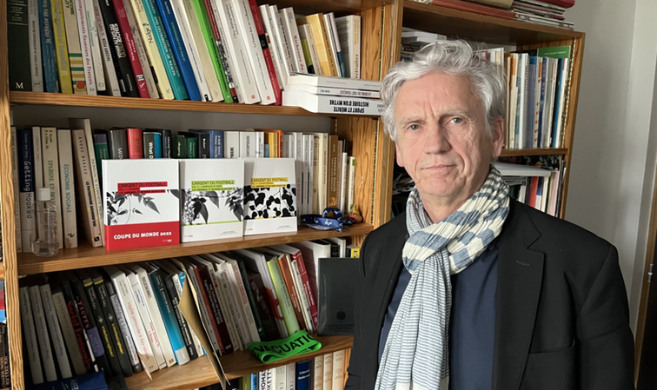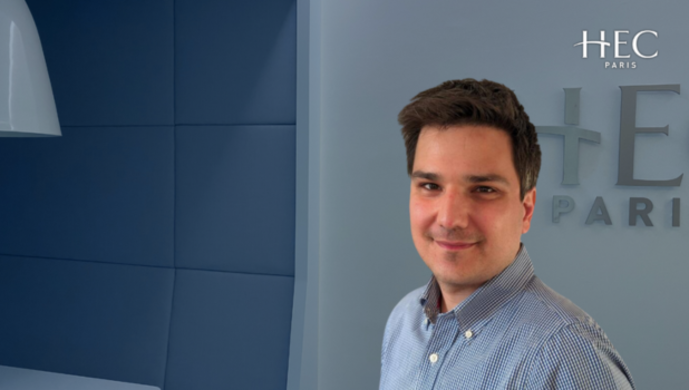listen to the podcast in french:
Luc Arrondel, what motivated you to accept leading this certificate dedicated to sports and business?
My motivation is multifaceted. The first aspect concerns its economy. When we talk about the sports economy in general and the football economy in particular, we often read many shallow things in the media. Thus, this motivation to help students better "read" the football economy. Another motivation is that, from an academic point of view, the sports economy is undervalued in economic science. Therefore, we need to show that football (since it is my field of preference) can be useful to the economy. For example, all the data we can draw from football to test certain economic hypotheses: decision-making at the moment of a penalty, the "great men" theory applied to coaches... It is this dual perspective that I wish to explore with HEC Paris students. Finally, I’m interested in seeing how the younger generations view sports compared to my somewhat older generation...
We can test economic hypotheses with all the data we can draw from football.
A month ago, Emmanuel Macron declared that the state would support similar programs at ESSEC, Centrale Supélec, and Sciences Po. Does this approach and that of HEC reflect a certain evolution in attitudes and trends towards this alliance between sports and the business world?
Yes, but I think it mainly corresponds to the evolution that sports and football have undergone over the past 30 years in society. My colleague Richard Duhautois and I call this the "Thirty Glorious Years of Football." Football has experienced double-digit economic growth since the 90s, driven by the famous Bosman ruling, the inflation of TV rights, the arrival of billionaires, and the creation of the Premier League in England. But football's growth has extended beyond its economy. The beautiful game also has social and societal weight today. When France won the World Cup in 2018, a million people were on the Champs-Élysées. Few economic sectors can mobilize so many people on a "victory" night.
Is this what sets football apart from other sports, or can we imagine such a reaction after a victory in handball, judo, or other disciplines?
No, it is mainly football that generates this phenomenon. Undoubtedly, the very nature of this discipline historically explains its success. It is a fundamentally simple and uncertain sport, and goals are rare; thus, David still has a chance to beat Goliath. Consequently, these specificities of the ball game have generated a passion that is not equivalent to other team sports. Moreover, football echoes the whole society; it has particularly politicized itself. In some countries, like Brazil, it is even said that it is no longer a sport but a religion.
Returning to HEC, what do you hope to gain from the exchange with students, and how might it feed your research, which is quite broad and varied?
The first objective is to debunk preconceived ideas. For example, we systematically hear in the media that football has too much money, footballers earn too much money, etc. Economically, football represents very little: in Europe, around 17 billion euros in revenue for the five major leagues, the Big Five. It is not very economical, with the largest French company, for example, having over 100 billion in revenue. The economic weight of football has nothing to do with the popularity it generates. There are, of course, things to improve from a financial and economic point of view. But as the economist Daniel Cohen said in the Nouvel Observateur, football operates in a very particular way compared to a traditional economic sector: it is one of the only economic activities where the money generated goes to the "workers" of football, less to those who preside over them. And football clubs do not earn that much money because it is distributed to footballers.
Moreover, these footballers often come from quite disadvantaged backgrounds. It is a highly meritocratic, highly elitist world, and very few footballers actually earn millions. Finally, I would say that the football economy has a moral dimension, even if it may offend some people.
In June, you will be part of the final jury for the HEC Sport & Business certificate. One of the certificate's challenges is redefining the contours of national sport "with boldness and innovation." So, it's about thinking a bit outside the box. What feedback do you expect from students at the end of their program experience?
The most interesting thing will be receiving the ideas they have explored to innovate, notably reflections on new potential involvements of supporters in the club: popular shareholding, crypto assets (fan tokens)... or the way to go to the stadium and consume there. Other topics will be explored: the model's sustainability, the environment, the development of women's football... All these ideas are interesting, and I look forward to seeing the future through their eyes, those of a new generation.
One of the interesting aspects of this program is its link with Racing Club de Lens, chaired by an HEC Paris alumnus, Joseph Oughourlian. Students went to Lens to immerse themselves in the club for a few days. Is this also something important for you to apply theory to practice?
It is fundamental, and it is the whole interest of this partnership. You have a case study, and it is interesting to apply a general analysis of the football economy to a club, to have a sound vision of what this business can become, and to investigate research on its development. In short, to see how it works. RC Lens has its peculiarities: it was created by a mining company with a strong historical capital. This link explains its supporters' enthusiasm, chants, and popular culture. The club is appreciated a little everywhere, beyond its city, perhaps because of this historical heritage that touches the whole region.
RC Lens today belongs to an investment fund, which corresponds to a current trend of investment funds massively investing in European and particularly French football. The club's budget is significant, especially since it was promoted to Ligue 1 and more recently qualified for the Champions League. It is a club that is now part of the top five budgets in France. It is, therefore, not a "small club" from an economic point of view. HEC students will thus have a unique insight into these two realities of "Football Business."








